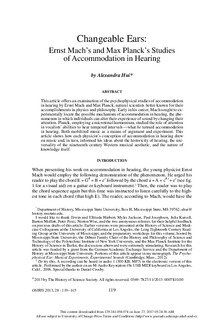| dc.description.abstract | This article offers an examination of the psychophysical studies of accommodation
in hearing by Ernst Mach and Max Planck, natural scientists better known for their
accomplishments in physics and philosophy. Early in his career, Mach sought to experimentally
locate the possible mechanism of accommodation in hearing, the phenomenon
in which individuals can alter their experience of sound by changing their
attention. Planck, employing a microtonal harmonium, studied the role of attention
in vocalists’ abilities to hear tempered intervals—what he termed accommodation
in hearing. Both mobilized music as a means of argument and experiment. This
article shows how each physicist’s conception of accommodation in hearing drew
on music and, in turn, informed his ideas about the historicity of hearing, the universality
of the nineteenth- century Western musical aesthetic, and the nature of
knowledge itself. | nb_NO |
